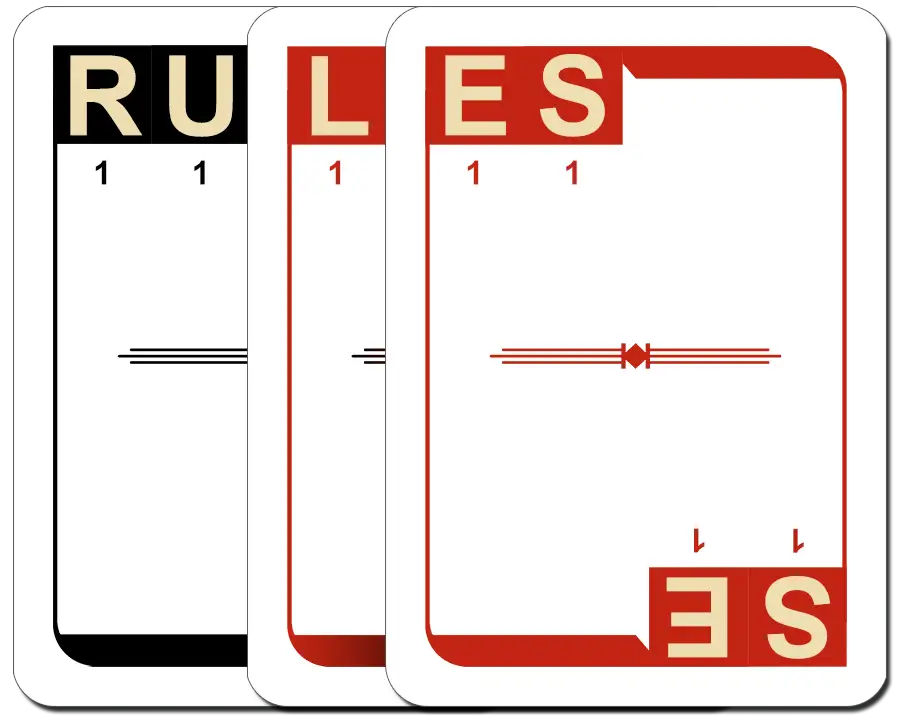So I’ve play tested myself and am enjoying it, “Scrabble® with cards” doesn’t do it justice, even if it’s a neat tag line. It’s not Scrabble® because you don’t have to figure out how to add to existing words in a crossword fashion. It’s a different kind of game, you can do your own thing or extend other words. In some respects it’s easier.
But wait, how can you play the game yourself, you haven’t told us anything about the rules!! Well done my young Padwan, great attention you pay!
Basic Rules
I’ve had the basic rules since Pt1 – “I think I’ve invented a game!”. The face value of letters adds up to give your word score and if you get a ★ you get a double word score. But these don’t constitute rules, I need to cover a lot of other issues, “what ifs”.
Starting from just those simple rules, as I play tested myself I had some issues and some ideas. Simple issues such as how many cards to deal to each player and what is involved in a single player’s turn?
How many cards?
It didn’t more than a couple of rounds of play testing by myself to realise that 5 cards was the optimal number. When thinking of regular playing cards, most card games have either 5, 7, 10 or 13 cards. These numbers make sense when dealing with a single character on playing cards and you have to make a hand, but I have 2 characters per card to make a hand or hands. 10 and 13 cards didn’t even get a look in. I played with 5 and 7, and 5 seemed like the right balance between having enough cards to play words and not enough cards to give a player too many choices, so called “analysis paralysis“.
A Player’s Turn
What is involved in a player’s turn? This proved to be one of the most divisive aspects during game development!
In most card games, you have 3 parts that make up a player’s turn :-
- Draw a card
- Make your hand public or private
- Discard a card/win game
In addition I need to add a 4th step, that of restocking your cards back up to 5, so that the game ends when all cards have been played. That is how I played the game, there isn’t much of a game if you just make the best word(s) you can with just 5 cards!
Discard a card!!! WTF!

Playtesting with Rebecca, wow!! She did not like having to discard a card! She went from 😤 to 😠 to 😡to 🤬 and I was like 😳!!
That’s what happens in Rummy and we’d been playing Rummy through lockdown! “Yes but it’s not right!”, “I don’t like discarding a card”, “That spoils a good word I could make next hand” and “That’s just a stupid rule, NO, you can’t do that!”.
Even after citing several examples of games that discard a card at the end of a turn, she still wasn’t convinced.
My thoughts were that it stops you holding onto cards that would make a good word next time, stops you hoarding both ★s to make a really high scoring word and also makes the game a bit more open and ‘exciting’, such that a player can then make a word from your discard!
I’m happy with any feedback but there was no logical justification so the rule stayed. The compromise is that there is a game variation, “No Discard”. Irony is, she either hasn’t read the instructions or she’s happy now, even if grumpy now and again when having to discard a high scoring card she can’t play.
Other Rules
The other rules were fairly straight forward, 2 letter word minimum, no abbreviations, TLAs or words capitalised, etc…
One slight issue with some early family play testers were about laying off cards against other player words. The rule as it is now, you can only extend by adding card(s) to the beginning and/or the end of another word. Somebody wanted to be able to use the letters in a played word as a free pile of letters that they could use in any order,… err no! This brings in analysis paralysis again and makes keeping track of played words nigh on impossible, unless you note them down as they are played.
Another one, which is more reasonable is to allow the same root word to be used after it has already been extended, so for example the word PLAY is extended by player 2 to be PLAYS. Then player 3 wants to make the word PLAYING using the original root word PLAY. This is reasonable and there is a game variation for this “Muti-Layoffs”.
Other rules are very similar to other word games and were obvious.
Scoring
I had the basics already sorted, but the idea of flushes, words of the same colour scoring double just sort of evolved. It was harder to make words with letters of the same colour so a player should be rewarded. Instead of making scoring complicated I opted for a consistent simple double word score.
Which lead me to think about what happens when a ★ of the same colour is played on a flush. Playing a ★ already gives a double word score so adding a same colour doesn’t seem fair that it simply doubles as well. Thus the double double score was made, technically a flush star double. This made big scores possible if you’re lucky with the cards and have a wide enough vocabulary. Even my 7 year old grandson can get them!
During some play testing, a big word was played, 7 letters or more. Again, this is clever and should be rewarded so the concept of big word bonuses needed looking at.
Following from a certain word tile game I decided to follow suit and award 50 points for a 7 letter word. But what about 8 and 9 letter words? As of today you get 50 points PER LETTER of 7 letter or more words. This bonus is applied BEFORE any doubles; flush, star double or flush star double. I’ve yet to play a game where an 8 letter word or higher has been played with any doubles so we’ll see if this causes game imbalance.

I suspect that if you are playing with a word nerd then they will wipe you out regardless of the score they could achieve with doubles. Time and more play testing will tell.
Which brings us neatly to the next installement, Pt5 – Play testing,… coming soon.

